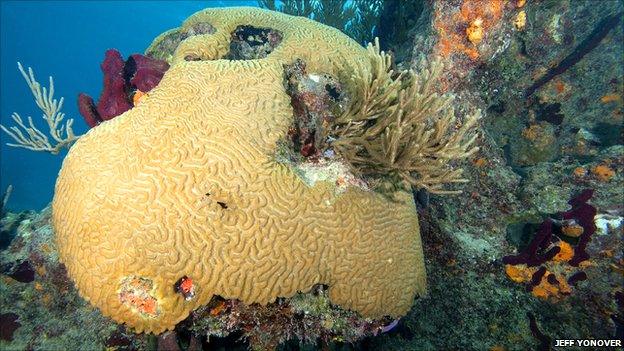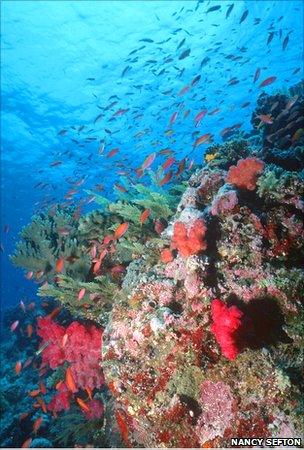Coral reefs heading for fishing and climate crisis
- Published

Healthy coral reefs provide a living for about 275 million people, with many more dependent on them
Three-quarters of the world's coral reefs are at risk due to overfishing, pollution, climate change and other factors, says a major new assessment.
Reefs at Risk Revisited collates the work of hundreds of scientists and took three years to compile.
The biggest threat is exploitative fishing, the researchers say, though most reefs will be feeling the impact of climate change within 20 years.
But, they say, there are measures that can be taken to protect at least some.
The report is compiled by a group of more than 20 research and conservation organisations, led by the World Resources Institute (WRI) in Washington DC.
"This report serves as a wake-up call for policymakers, business leaders, ocean managers, and others about the urgent need for greater protection for coral reefs," said Jane Lubchenco, head of the US National Oceanic and Atmospheric Administration (Noaa).
"Local and global threats, including climate change, are already having significant impacts on coral reefs, putting the future of these beautiful and valuable ecosystems at risk."
The report revisits some of the territory explored in the original Reefs at Risk project, published in 1998, but in much greater detail.
Over the 13 years intervening, the area at risk of destruction has increased by nearly a third.
The main reason for that change has been a massive increase in damage from exploitative fishing, particularly in the Indian and Pacific Oceans.
Climate of death
Altogether, more than half of the world's reefs are threatened by the ways in which fishermen use them.

Tackling issues such as fishing and pollution can keep reefs healthy, the report says - for now
These range from simply catching more than nature can replace to the use of extremely damaging fishing methods such as dynamiting fish to stun or kill them - which also blasts coral formations to smithereens.
Other major threats are pollution carried in rivers, coastal development, and climate change.
If climate projections turn into reality, then by 2030 roughly half of the world's reefs will experience bleaching in most years - rising to 95% during the 2050s.
Coral polyps - the tiny reef-building creatures - live in partnership with algae that provide nutrition and give corals their colour.
When the water gets too hot, the algae are expelled and the coral turns white.
Although reefs can recover, the more often it happens, the more likely they are simply to die.
In addition, the slow decrease in the pH of seawater as it absorbs more carbon dioxide - usually known as ocean acidification - will compromise coral's capacity to form the hard structures it needs.
"Reefs are already being hit by global warming," said Mark Spalding, senior marine scientist with The Nature Conservancy.
"They are the canaries in the coal mine, super-sensitive to warm summer temperatures, such that even a small background induces bleaching.
"Into the future, I suspect warming and acidification will become the major threats, but as we say again and again, no threats act in isolation; often it's the combination that really hurts," he told BBC News.
'Lower the pressure'
Regionally, southeast Asia is the worst affected region, with 95% of reefs on the threatened list.
But in terms of the impact on human society, threat is only part of the equation.
The researchers reasoned that societies most affected by reef degradation would be those where the threats are high, where a big proportion of the population depends on reefs for their livelihood, and where people's capacity to adapt is low.
Combining these criteria, the countries highest on the risk register are Comoros, Fiji, Haiti, Indonesia, Kiribati, Philippines, Tanzania and Vanuatu.
Against this bleak backdrop, the researchers have been at pains to emphasise that there are things that can be done to reduce the damage.
"There are reasons for hope," said Lauretta Burke, senior associate at WRI and a lead author of the report.
"Reefs are resilient; and by reducing the local pressures, we can help buy time to find solutions to global threats that can preserve reefs for future generations."
Research has shown for example that allowing a diversity of life to flourish on a reef keeps it healthy and more resistant to rising water temperatures.
Protecting important regions of sea would be one obvious strategy.
However, having evaluated more than 2,500 protected areas of reef, these researchers concluded that even though over a quarter of the world's coral is nominally protected, only one-sixth of those areas offer good protection.
"The report is full of solutions - real world examples where people have succeeded to turn things around," said Dr Spalding.
"However, if we don't learn from these successes then I think that in 50 years' time, most reefs will be gone - just banks of eroding limestone, overgrown with algae and grazed by a small variety of small fish."
- Published6 January 2011